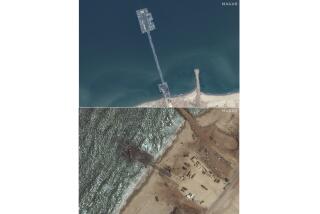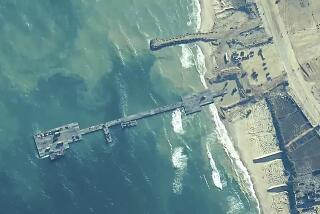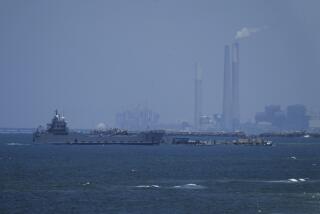Just a Start but It <i> Is</i> a Start : Marines’ first days in Somalia let in ray of hope
- Share via
American troops have accomplished more in Somalia in a week than the United Nations managed to do in the previous year. There is much more to be done--including securing Baidoa, the center of starvation. But there is reason for a little hope.
Two major warlords are talking instead of fighting; a cease-fire is in place between Mohamed Farar Aideed and Ali Mahdi Mohamed. They are scheduled to meet again today with U.S. envoy Robert Oakley. These men can bring peace to the capital, Mogadishu, if they can agree on a reconciliation process.
The current cease-fire, though largely symbolic, could provide the foundation for a broad consensus among the major players--including warlords outside Mogadishu--who have competed with bullets to rule the remnants of a nation ravaged by civil war, drought and famine.
A U.N. ship docked at the port in Mogadishu for the first time in nearly a month. The presence of foreign troops allowed that ship to bring in 60 tons of life-sustaining grain. Earlier ships were looted by the ton; such theft and violence continue in Baidoa.
Water supplies were also freed of political entanglements. U.N. representatives negotiated an agreement to restart the main water plant, and to eliminate extortion. The armed extortionists who had patrolled that facility also got something out of the deal--a promise of jobs.
In the interior, mass starvation continues to claim Somali families. The death toll is particularly high in Baidoa, west of the capital. Help, however, is on the way. For security reasons, American commanders won’t reveal precisely when they will act to secure that dangerous area in their campaign to allow more relief supplies to get to the feeding centers. Other foreign commanders indicate they expect to arrive before the end of this week--with the help of U.S. troops.
Troops from Saudi Arabia, Egypt and other Muslim nations are also expected to arrive soon in Somalia. Their presence should reduce the criticism by Muslim fundamentalists about non-Muslim soldiers policing a predominantly Muslim nation.
African soldiers rarely leave their homelands because of tradition and the Organization of African Unity charter, which bars interfering in the affairs of African nations. However, soldiers from Nigeria and Zimbabwe may join forces from Australia, Belgium, Canada, France, Italy and other nations in what must become a truly multinational and broad-based mission of mercy.
Despite the criticism this military mission has gotten--it’s too slow, too heavy-handed, ad nauseam--Somalia is finally getting the help it needs to relieve starvation.
More to Read
Sign up for Essential California
The most important California stories and recommendations in your inbox every morning.
You may occasionally receive promotional content from the Los Angeles Times.













